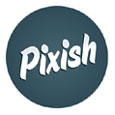 Design contest site Pixish announced that it will be closing its doors at the end of the month, just shy of 9 months since it opened. Pixish was a design marketplace similar to SitePoint’s own 99designs and was founded by famed graphic design Derek Powazek.
Design contest site Pixish announced that it will be closing its doors at the end of the month, just shy of 9 months since it opened. Pixish was a design marketplace similar to SitePoint’s own 99designs and was founded by famed graphic design Derek Powazek.
Pixish launched last February and operated a bit differently than its competitors. I always got the impression that the site’s target audience was not small-to-medium sized businesses looking for graphic design work, but rather aimed at a more artistic and hobby-oriented set of users. One of the major departures from the structure of other sites that set Pixish apart, was that contest prizes did not have to be monetary. One of the initial launch contests on the site, for example, sought photos for Powazek’s magazine Fray, with copies of the magazine as the competition’s only prize.
At its peak, Pixish had just 5,000 users, and never gained wide traction. Comparatively, market-leader 99designs has over 20,000 registered designers.
Powazek says the decision to shutter Pixish was “mostly because of personal stuff,” but wrote a great parting blog post in which he details what went wrong and what he learned.
According to Powazek, they did three main things wrong:
- They launched too fast. The plan was to “launch fast, get feedback, make changes.” Unfortunately, Pixish got more feedback that it could handle and didn’t make changes fast enough to satisfy users. “You can’t expect people to wait for you to get it right,” says Powazek. It actually sounds more like they botched things post launch rather than launched prematurely.
- They didn’t describe what they wanted to do clearly enough. According to Powazek, the site was confusing for first time visitors. The site never seemed quite as structured as its competitors, and for that reason, it didn’t attract as many contest holders. In essence, this was a user experience issue. Good idea, poor execution.
- They underestimated the “spec work” issue. “People feel strongly about it, and as a professional designer for over a decade, I get it,” says Powazek. “In hindsight, we could have dealt with it better.” My guess is that because prizes did not have to be monetary and there were less guidelines in place to protect designers than at competing sites, Pixish may have been hit harder by the “no spec” advocates.
I’ll offer another reason Pixish may have failed: poor timing. Pixish launched just a couple of months before crowdSPRING, a very well-funded design contest marketplace, appeared on the scene and grabbed all the headlines, and at about the same time that SitePoint was spinning off the Contests section of their marketplace to create 99designs, which is the leader in the space and attracts the lions share of contests. Pixish didn’t stand a chance going up against those two juggernauts.
Powazek’s announcement blog post also offers some good lessons for anyone trying to launch any sort of web business:
In community-generated media, trust is everything. Says Powazek, users are naturally and understandably wary about uploading their hard work to just any site. Creating an environment where users could trust Pixish and trust each other was something that they could have done better.
There’s a difference between building a community and a network. “Pixish was designed as one community, but it really was a network of unaffiliated communities,” writes Powazek. “The assignments that worked best happened because the publisher brought in their own people. The site was not optimized for that.”
Powazek talks about wishing they had created tools allowing people to tie Pixish contests into their own sites. The lesson for others here is that you should let your users live where they’re most comfortable and interact with your content on their terms (widgets, RSS feeds… data portability anyone?).
Launch fast, but not too fast. You only get one chance to make a first impression. The old cliché is actually true, says Powazek. Make sure you test your core idea beforehand and have the initial presentation right. It’s hard to recover if you stumble out of the gate, even if you’re agile.
Money matters. Powazek has experience on both sides of the funding coin, and according to him, having money makes things a lot easier. That seems obvious, but these days a lot of companies are preaching the low-money/no-money bootstrapping route as the best for any web startup. According to Powazek, the best approach is whichever one works for you and your project.
“When you’ve got money, you can take more time to do it right, but you’ve got higher expectations for returns, and a whole host of other complications,” he says. “When you go it alone, you’ve got the freedom to do whatever you want, but it’s hard to stay focused when the project is always competing for your attention with other, usually paying, work.”
Finally, it’s all about the team. That’s something we hear from investors all the time: it’s all about the people, not the ideas. One thing Pixish did right, says Powazek, was assemble a great team. That’s a must for your startup to succeed.
 Josh Catone
Josh CatoneBefore joining Jilt, Josh Catone was the Executive Director of Editorial Projects at Mashable, the Lead Writer at ReadWriteWeb, Lead Blogger at SitePoint, and the Community Evangelist at DandyID. On the side, Josh enjoys managing his blog The Fluffington Post.


